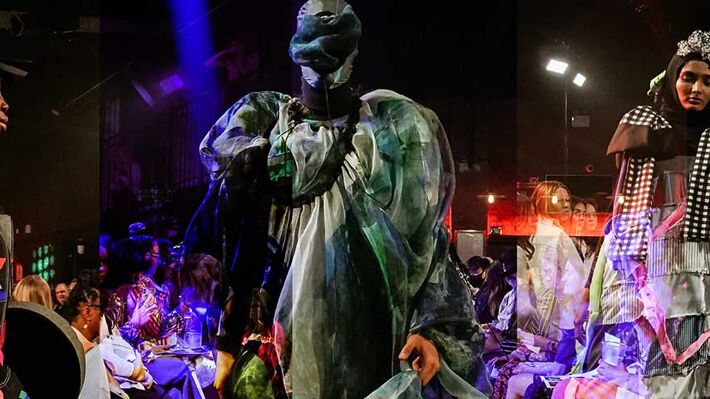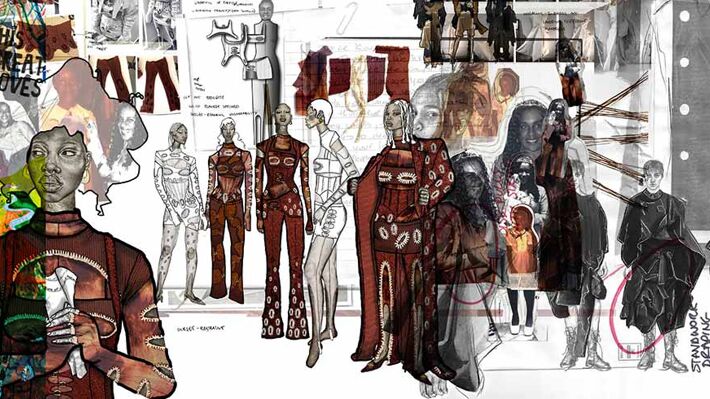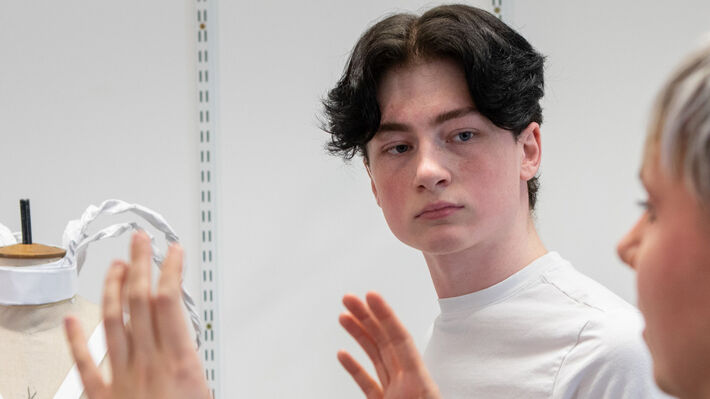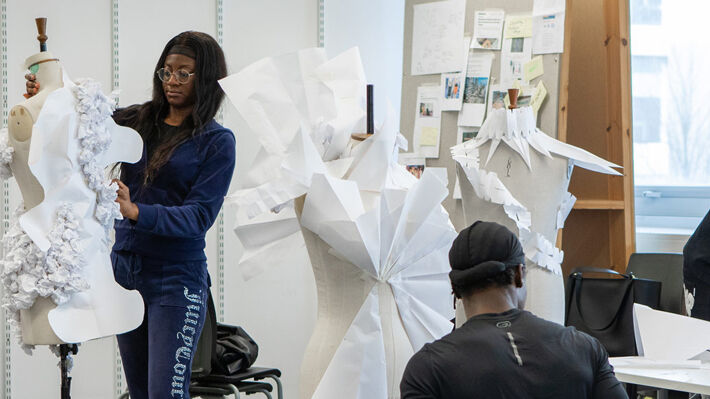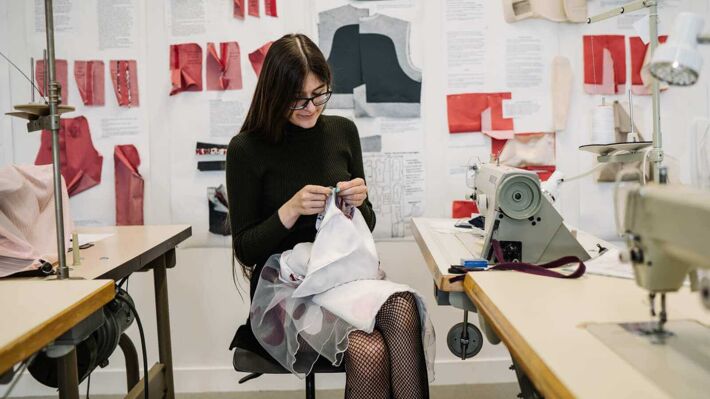Fashion Design with a Foundation Year - BA (Hons)
Currently viewing course to start in 2026/27 Entry.
Our BA Fashion Design Course at Birmingham City University will provide you with a comprehensive fashion design education. The course encourages innovation in both design skills and technical craftsmanship with a focus on sustainability, system thinking and socioeconomic practice....
- Level Foundation
- Study mode Full Time
- Award BA (Hons)
- Start date September 2026
- Fees View course fees
- Subject
- Location City Centre
This course is:
Open to International Students
Overview
Our BA Fashion Design Course at Birmingham City University will provide you with a comprehensive fashion design education. The course encourages innovation in both design skills and technical craftsmanship with a focus on sustainability, system thinking and socioeconomic practice. We will provide you with international opportunities and integration with our industry partners to empower you to explore your individuality, creativity, and future employability.
The foundation year is an exciting step towards your chosen creative degree pathway. You will embark on a fun, creative year of discovery. An opportunity to innovate, experiment, develop craft and research skills, equipping your professional journey into the creative industries.
We will support you to become part of the Birmingham City University’s Fashion & Textiles community, where you can fully explore yourself within an inclusive environment, amongst a likeminded and diverse peer group.
Our bespoke course encompasses Fashion Design, Textile design, Fashion Business and Fashion Communication degree routes. Providing you a platform to collaborate, share and learn from others. You will develop visual communication, subject specific craft skills, and processes to build confidence and independence ready for the next stage of your degree.
We aim to innovate, excite, engage, and challenge you. Inspiring and encouraging you to develop your personal aesthetic, offer sustainable awareness, and ignite a lifelong enthusiasm to learn. We are proud to see our foundation students continuing to thrive as they progress through the degree pathways and graduate as leaders within the industry.
Within your first year of undergraduate study, you will explore pure fashion design skills through a fundamental grounding in garment knowledge, construction, materiality, fabric and fibres analysis, tailoring and drape delivered in an atelier environment. In your second year you will discover systems thinking in relationship to Fashion design and our course’s structure will allow you to strategically balance between physically traditional and virtually digital craftmanship. Your final year of study provides you with the opportunity to express your individual design methodology in one of many creative formats, including a collection of garments, fashion products, material research and digital design technology.
We will guide you with the decision of taking a placement year between your second and final year of study. Our dedicated internal careers team will support you through this process. We are proud that our recent cohorts have taken year placements with renowned designers such Paul Smith, Christopher Kane and Craig Green as well as industry super brands such as Superdry, NEXT and Adidas. We let you choose your design identity and tread your own design path.
You will work with industry experts and a dedicated team of academic researchers and practitioners. A decolonised curriculum structures the innovative approach to 2D and 3D design resulting in diverse experts of your craft. You will study a programme that is specifically designed to produce job-ready graduates with transferrable skills that can form and reshape our industries.
Our Fashion Design Course has built a reputation for students entering the industry as original, creative, independent thinking employable designers. Our award-winning graduate portfolios and fashion collections are showcased on international, digital, and local west-midland based platforms.
What's covered in this course?
The course equips you with the necessary knowledge, skills and attributes to succeed in a wide range of careers in the fashion industry.
Your first year will introduce you to a number of fashion topics, helping you to develop a good foundation of fashion knowledge and skills, in both design and technical areas.
Your second year helps to strengthen your personal and professional development in relation to your own career goals. You will also have the opportunity to apply to take part in an international exchange programme, spending a semester at a partner university.
Your final year, gives you the opportunity to specialise in women’s or menswear. You will focus on your own individual area of practice and produce garments that reflect your personal direction as a creative fashion design graduate.
The course blends individual creativity and commercial realism, and you will be able to apply your skills and knowledge of the professional design process, from concept to product.
I'm so glad that I did the foundation course here because it is a great stepping stone before the degree level and I think I came into my first year feeling much more confident than I ever would have done if it wasn't for the foundation year. It definitely prepared me for beginning my degree course.
Lucy Ettinger, Foundation Year
I didn’t have any experience in fashion so the foundation course allowed me to gain as much experience as I could before going on to the degree. I liked using the machinery and the print room and getting used to sketchbook work that prepared me ready for the degree.
Abbie Wells, Foundation Year
Why Choose Us?
- You will have opportunities to take part in exciting social events and competitions with industry giants and leading retail businesses such as Freetrain and Harvey Nichols, which will help you secure professional experience and gain important commercial awareness.
- The foundation year will enable you to explore all of the different degree pathways to help you choose the right course ready for the step up to degree.
- On the foundation course you will be part of a community, building your knowledge of the equipment and facilities available, getting to know staff and your fellow students through social events and our end of year exhibition.
- We have excellent links with regional and international brands such as Burberry, John Lewis, SuperDry and Rab, which give the course colour and contemporary relevance.
- You can enjoy a vast archive of fashion publications dating back to the 1930s and develop digital skills within Adobe Illustrator, Photoshop and Clo 3D, essential industry tools within the global fashion industry.
- You will have the chance to showcase your final year work to industry leaders looking for talent at national and regional events.
Open Days
Join us for an Open Day where you'll be able to learn about this course in detail, chat to students, explore our campus and tour accommodation. Booking isn't open for the next event yet. Register your interest, and we'll let you know as soon as booking goes live.
Next Open Day: Friday 26 June
Entry Requirements
Essential requirements
80 UCAS Tariff points. Learn more about UCAS Tariff points.
If you have a qualification that is not listed, please contact us.
Fees & How to Apply
UK students
Annual and modular tuition fees shown are applicable to the first year of study. The University reserves the right to increase fees for subsequent years of study in line with increases in inflation (capped at 5%) or to reflect changes in Government funding policies or changes agreed by Parliament. View fees for continuing students.
Award: BA (Hons)
Starting: Sep 2026
- Mode
- Duration
- Fees
- Full Time
- 4 years
- £9,535 in 2026/27 ✱ Important note for this price
- Apply via UCAS
(↩Back to price) * The Government is proposing to apply an inflationary increase to regulated tuition fees for 2026/27 and the University is planning on increasing fees to that maximum level once confirmed.
International students
Annual and modular tuition fees shown are applicable to the first year of study. The University reserves the right to increase fees for subsequent years of study in line with increases in inflation (capped at 5%) or to reflect changes in Government funding policies or changes agreed by Parliament. View fees for continuing students.
Award: BA (Hons)
Starting: Sep 2026
- Mode
- Duration
- Fees
- Full Time
- 4 years
- £18,570 in 2026/27
Guidance for UK students
UK students applying for most undergraduate degree courses in the UK will need to apply through UCAS.
The Universities and Colleges Admissions Service (UCAS) is a UK organisation responsible for managing applications to university and college.
Applying through UCAS
- Register with UCAS
- Login to UCAS and complete your details
- Select your course and write a personal statement
- Get a reference
- Pay your application fee and submit your application
You are not required to submit a portfolio for this course.
Course in Depth
Foundation year
In your Foundation Year, you will gain a grounding in a variety of skills from each of our degree pathways, including blog writing, textile techniques, branding, creating garments and more. You will be able to explore the Fashion and Textiles workshops and CAD suites to pursue your individual interests.
In order to complete this course you must successfully complete all the following CORE modules (totalling 120 credits):
As part of the fashion and textiles industries it is vital that you are able to utilise visual and written communication to convey a narrative. In this module you will learn about visual communication and specifically how it applies to these industries. You will learn key transferable skills that you can utilise in your degree pathways and in your future career.
Whether you are a fashion design, textile design, fashion business and promotion or fashion branding and communication student it is important that you understand the key construction and processing skills relevant to the Fashion and Textiles industry. In this module we will show you how these key skills inform your degree pathway and future career.
Trend forecasting is a global industry developed to research and formulate predictions to inform brands and retailers on what products should be designed and sold.
This module you will focus on techniques and strategies for identifying, researching, and documenting trends, and how trend analysis can be used in professional practice. You will analyse what a trend is, exploring past, present, and future trends using a variety of sources. Researching an existing trend and communicate your findings.
This module will allow you to develop an understanding of how the world and lifestyles are changing, and how fashion and textiles respond to these changes. Through lectures and workshops, you will be introduced to a range of themes, discussion topics, exploring social and industrial changes, and their impact on society. You will develop skills and understanding of a fashion business through the set-up and development of a brand.
This module will allow you to plan, develop and deliver a project that draws on your own, personal creative strategies, it is your chance to show off a range of skills that embrace a plethora of ideas and concepts. This is an opportunity to showcase your personal design style and produce a body of work that will enhance your next steps onto your degree programme.
Year one
In your first year you are introduced to a broad range of fashion studies theory and technical skills, building a sound base for further study in years two and three.
You will learn design skills such as CAD, live fashion drawing, fashion illustration, fashion flats, styling and photoshoots. Alongside this, you will gain theoretical skills, such as contextual studies in fashion and related art and design.
You will also gain the skills that you need to solve practical problems and create presentations.
In order to complete this course you must successfully complete all the following CORE modules (totalling 120 credits):
In this module you will explore the connections between the creative fashion and textile industries in the past, and how this informs present and future trends. You will be introduced to the way individuals have influenced culture, freedom of expression and experimentation, and how this pushes boundaries and explores identity.
Through reflection you will analyse your research and the connections that you discover, developing core skills and communicating your findings and ideas through the use of industry-standard software.
Shared content is delivered via blended learning, this is underpinned by your course-specific content which is delivered on campus.
During this module you will unleash your creativity and explore the vibrant role of fashion designer. You will undertake a multidisciplinary journey where you will craft and design garments with the intent to hone and develop your own set of specialist skills to inform your artistic vision. You will be tasked to create original concepts and to play with 2D and 3D forms, sourcing fabrics, and sketching mixed media illustrations.
The Fashion design technology module will require you to explore the rich heritage of traditional flat pattern cutting techniques, guided by seasoned pattern cutting experts. Engage in a dynamic series of introductory workshops and seminars that will take you from the art of drafting patterns to the construction of physical toiles. You will acquire core skills in flat pattern cutting, draping, stand manipulation, and the cutting-edge Lectra technology processes. You will develop a solid foundation in pattern cutting that is crucial for becoming a well-rounded fashion designer.
You will be introduced to systems thinking to create designs that not only look incredible but also make a statement and drive an impact for change. Connect the dots between conceptual design and garment functionality to understand the bigger role of fashion designer and the Fashion supply chain. You will be encouraged to explore the fashion archives, delve into historical garments, research contemporary fashion designers and current global trends to shape your innovative design approach.
AI Integration will form part of your approach to problem-Solving: To kickstart the creative process, you will design something using AI on the first day of the module. You will receive a half-designed technical drawing and be tasked with solving a problem, sparking innovative thinking from the outset. Workshops, skill seminars, and technical sessions will then empower you to develop samples that will be included in your rudimentary design pack.
Year two
In your second year, you will develop more advanced research, design development, presentation and technical skills, with a view to gaining work experience that will enhance your skills and employability upon graduation.
In order to complete this course you must successfully complete all the following CORE modules (totalling 100 credits):
This level 5 undergraduate module is designed to equip students with the essential skills and knowledge necessary for a successful transition into the industry work placement and beyond. The module focuses on cultivating a deep understanding of professional practices, industry expectations, and personal development strategies.
Through a combination of theoretical knowledge, practical exercises, case studies, and industry guest lectures, this module provides students with a solid foundation for their future careers empowering them to thrive in a competitive and dynamic industry landscape.
Tailoring serves as the backbone for honing your understanding of form and silhouette manipulation.
You will learn traditional bespoke techniques from menswear tailoring such as padding, pitch, fit, function, hand and pad stitch, moulding and building shape into fabric, and sewing and pressing techniques. These traditional technical skills will serve as tools for your artistic innovation. They will enable you to not only meet industry standards but also push creative boundaries. Traditional tailoring techniques are not just methods; they become the language through which your unique design voice will be articulated.
In this experimental fashion design module, you will aim to create a body of work that will form the essential skills and knowledge needed to create a work placement portfolio that showcases your creativity but also reflects a commitment to sustainability and ethical practices. The focus will be on merging cutting-edge digital design skills, advanced technical expertise, an understanding of fabric properties, and a thoughtful approach to design that minimises environmental impact and engages with a community output.
In order to complete this course you must successfully complete at least 20 credits from the following list of OPTIONAL modules.
The purpose of the work placement module is to enable you to develop professional attributes and subject skills through experience in the work place, and to critically reflect upon your learning in that context. You will normally be expected to arrange your own placement, with support from academic staff and BCU Careers.
This module provides an opportunity for you to apply your knowledge and skills to an external, professional brief. The brief will be set by or in discussion with an external client/agency/community and could be a ‘real life’ problem to be solved, or a simulation. The resulting project should consider sustainability and address relevant UN Sustainable Development Goals as a key aspect of contemporary creative industries work. The module provides an opportunity for you to engage in a responsive, imaginative and professional manner with an aspect of your subject area, which contributes to the development of employability skills within the supportive infrastructure of the University. You will collaborate with students, and where relevant with other stakeholders, and will be supported to approach the project with curiosity, openness, critical thinking, innovation and practical and technical skills, in order to produce project outcomes and/or solutions which meet the required brief.
Creative careers can take people to a wide variety of, sometimes, unexpected destinations. Learning to see and exploit opportunities can be the key to a rewarding portfolio career making good use of your creative skills whilst earning a living from doing what you love, whether it's producing creative artefacts, performing, offering a service or consultancy. Learning to promote and ‘pitch’ those ideas to others is core to developing a successful independent, creative and entrepreneurial career. This module will build your skillset to enable you to talk confidently about you and your work. It will also help you to find or create opportunities, some may even come as a surprise to you!
Core modules are guaranteed to run. Optional modules will vary from year to year and the published list is indicative only.
Year three
In order to complete this course you must successfully complete all the following CORE modules (totalling 120 credits):
This Level 6 undergraduate module is designed to further develop your research and inquiry skills within the context of the fashion and textile industry.
You will undertake a range of research methods on a topic of personal interest. You will investigate and critically analyse the findings. You will be applying a reflective comment to the evidence to deepen your understanding of your field and considering real-world challenges in the industry.
You will present conclusions and recommendations in a proposal that feed into an independent project.
Your pre-collection module will ask you to focus your previous learning and provide you, the designer, with the opportunity to unleash your creativity, implement your acquired technical skills, and showcase a personalised design methodology that reflects your unique perspective. The module emphasises negotiation with your tutor to explore diverse outcomes in the realms of digital design, material selection, and garment creation, fostering an environment where your ideas flourish and push the boundaries of conventional fashion.
During your Collection Construction Module, you will embark on an advanced journey, seamlessly integrating your accumulated design knowledge into the meticulous construction of a signature collection and or body of negotiated work. You will be required to refine your design methodologies through close collaboration and negotiation with tutors, ensuring that creative visions align with industry standards, and sustainable ethical practice. You will be required to document the fit, form, silhouette, and function of your garments, as you reflect on the development during construction of your collection and how those garments interact with the human and/or 3D forms.
You will immerse yourself in a comprehensive exploration of your creative abilities, culminating in a multifaceted showcase of your skills. You will have the opportunity to direct and create your own Lookbook photoshoot, where you conceptualise and execute a visually compelling documentation of your previous collection outcomes, Recording your proficiency in design, styling, and storytelling. Additionally, emphasis is placed on the art of presentation and curation, where you learn to articulate your design concepts effectively and curate a cohesive narrative during an internal platform or external showcase. You will refine your communication skills and enhances your ability to engage new audiences with your work.
Download course specification
Download nowThe Foundation year encourages experimentation and play whilst exploring a breadth of skills to help you with your step up to your degree.
This course is ideal if you intend to pursue a creative career in fashion design and related industries. Our previous graduates work within companies including H&M, Victoria Beckham, Marks & Spencer and Erdem, as well as many other international brands.
Within the first year you will be introduced to the fundamental skills needed to work within the fashion industry including fashion theory, commercial and conceptual design, trend research and garment development.
During your second year, you will develop these skills to a more focused and advanced level before applying for work experience within your chosen sector of the industry, with the option of a sandwich year between the second and third years of study.
In your final year, you will design and produce a collection of garments plus associated portfolio work for your major project, with a focus on either the menswear or womenswear market sectors.
On successful completion, you will graduate with a portfolio-based final outcome relevant to your individual career aspirations.
Discover the community in the College of Jewellery, Fashion and Textiles where our students talk about their journeys here at BCU which has inspired creativity and innovation.

Foundation student project
Students on the Fashion and Textiles Foundation took part in The Signature Project where they used personal creative strategies to show off a range of skills and showcase their personal design style in preparation for the next step of their chosen degree.
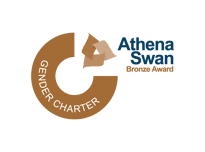
Athena Swan Bronze Award
Our Jewellery, Fashion and Textiles courses have been awarded the Athena Swan Bronze Award for our commitment to Equality, Diversity and Inclusion (EDI).
Athena SWAN is a quality charter mark framework and accreditation scheme established and managed by the UK Equality Challenge Unit in 2005 that recognises and celebrates good practices in higher education and research institutions towards the advancement of gender equality: representation, progression and success.
Employability
The course is ideal if you intend to pursue a creative career in fashion design and related industries. Throughout the degree, you will develop the fundamental skills needed to work within the fashion industry, equipping you with the necessary knowledge, skills and attributes to succeed in your creative practice.
You will have the opportunity to apply for work experience in your chosen sector of the industry during your second year, with the option of a sandwich year between the second and third years of study. On successful completion, you will graduate with a portfolio-based final outcome relevant to your individual career aspirations.
Graduate jobs
Graduates from our course progress to gain jobs within many of the major high end and high street companies, both within the UK and overseas. You’ll find Birmingham City University alumni working in Adidas, Marks & Spencer, Erdem and Victoria Beckham.
Placements
A requirement of the optional sandwich year within our course is to gain valuable experience to enhance employability within our students. Our students can be found gaining experience in may major fashion brands including; H&M, Next, Amanda Wakeley, Mary Katrantzou and Iris Van Herpen.
Links to industry
The College of Fashion and Textiles works with local, national and international businesses to enhance student learning through placements, workshops, live briefs and guest lectures from industry professionals.
Throughout our course we actively encourage collaboration sponsored and live projects with the fashion industry. We have worked with Paul Smith, Burberry, George and Rab. These collaborations underpin our delivery and add value to the curriculum within the course.
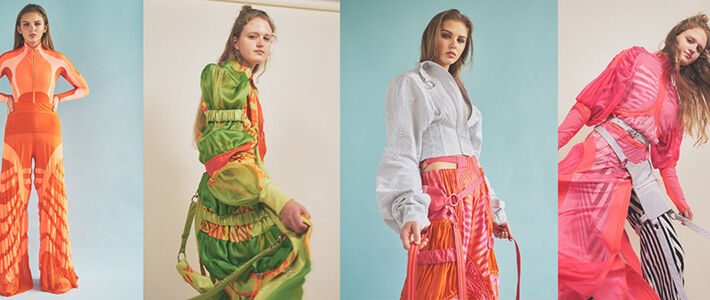
Holly Jayne Smith
Immediately after graduating, Holly was offered a Residency Scholarship in Morocco after being selected to show her BA collection at the Gala Event at Graduate Fashion Week. While in Morocco, Holly engaged with the country’s fashion industry and worked with students at the Casa Moda Academy in Casablanca.
Holly has since returned to the University as a Designer in Residence and a Visiting Tutor, while also working on starting her own label!
Facilities & Staff

Our Facilities
Fashion and Textiles courses are based at our Parkside Building, which is part of our multi-million pound City Centre Campus development in the heart of Birmingham's Eastside development.
Our staff
Louise Martin
Lecturer in Foundation Year Fashion and Textiles
Louise’s Masters in textile design established the foundation for her design journey. From this platform, Louise started to build a career as an interior designer, regional design manager, stylist, and as a lecturer in fashion and textiles. Louise now has over 10 years' teaching experience as a lecturer.
More about LouiseNatalie Martin
Course Leader in Foundation Year Fashion and Textiles
After graduating with BA (Hons) Fashion Design from BCU Natalie has worked with brands such as Joseph Turvey and Hades Knitwear as a freelance designer, production assistant and illustrator as well as working on show production for presentations at London Fashion Week Mens. Working hands-on with small, luxury brands has enabled her to gain a...
More about Natalie